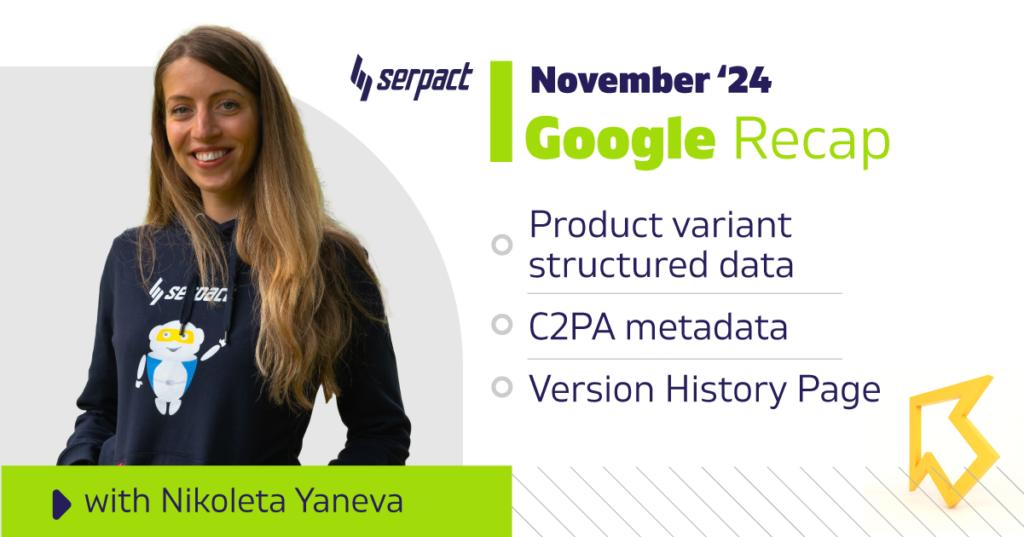Google Recap: May 2024
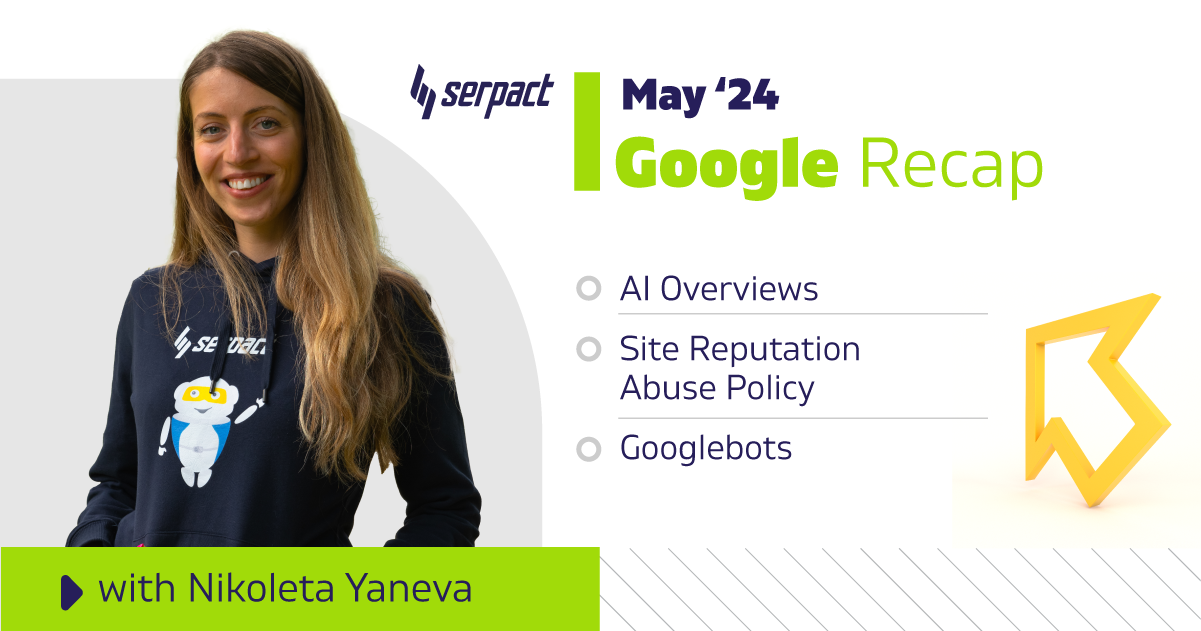
Gary Illyes from Google on hreflang
At the beginning of May, shortly after the spring edition of SERP Conf. 2024, Gary Illyes from the Google team shared on LinkedIn what he learned and heard from lots of SEO specialists during the conference.
One of these thoughts is that hreflang can be annoying. In this regard, Gary said he is open to ideas for Google to develop something less annoying but still effective for both small and large websites.
A few other things he shared that he learned and provided feedback on are:
- Fear of and confidence in AI – Gary said AI is a tool like any other. You can use it as you like as long as it helps you create high-quality and helpful content;
- SEO is dying – The company observes that whenever there are changes in the search engines, statements about SEO being dead start to appear. Gary Illyes clarified that SEO is not dying but is constantly changing along with the search engines.
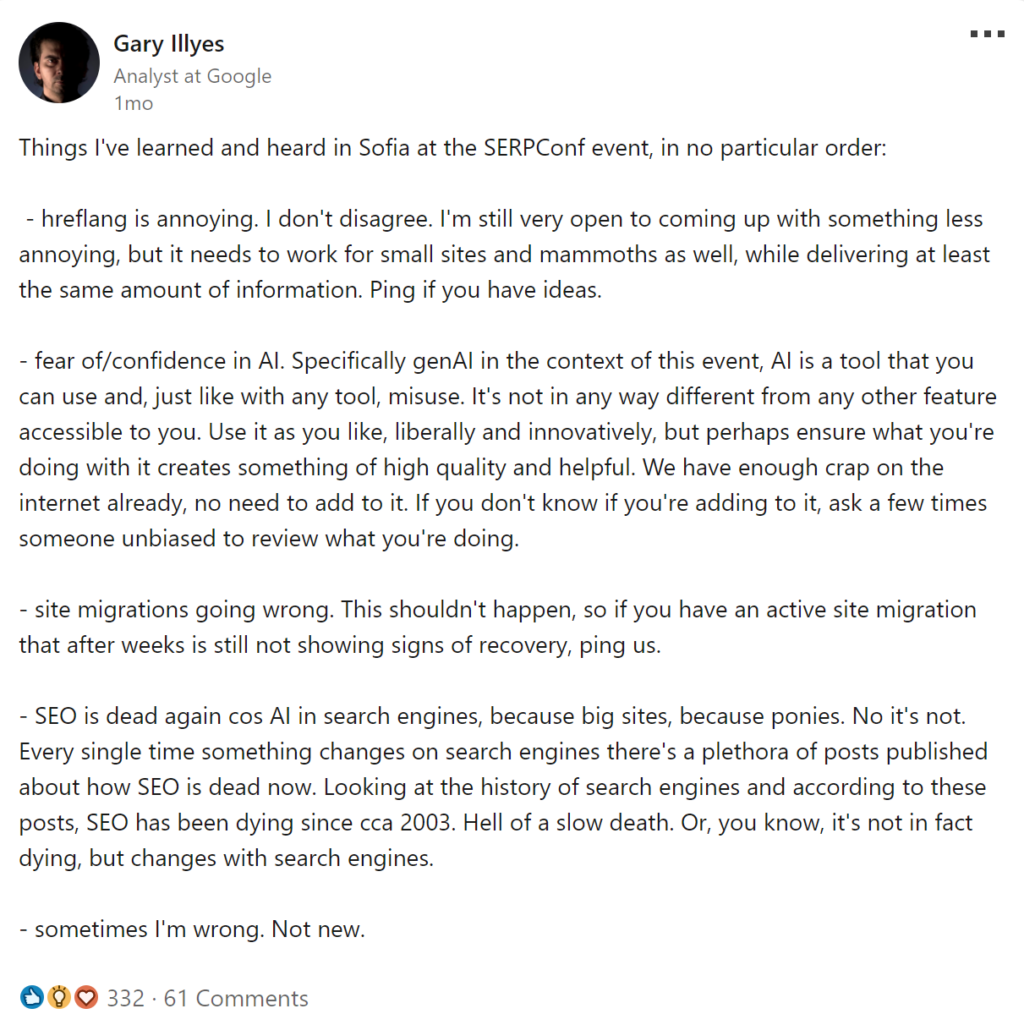
Google officially released AI Overviews
In May, Google officially launched AI Overviews. The service is now available in the United States and is expected to roll out in other countries by the end of this year.
AI Overviews are generative AI responses. It is essential to clarify that these are not featured snippets.
Their purpose is to provide answers to user queries using Google’s Gemini. When a user submits a query in the search engine, Google formulates an answer with the help of AI. Below these answers, Google adds links to various sources in case the user needs more in-depth research.
AI Overviews are intended to be displayed only for more complex queries.
Here is how they will appear in the SERP:
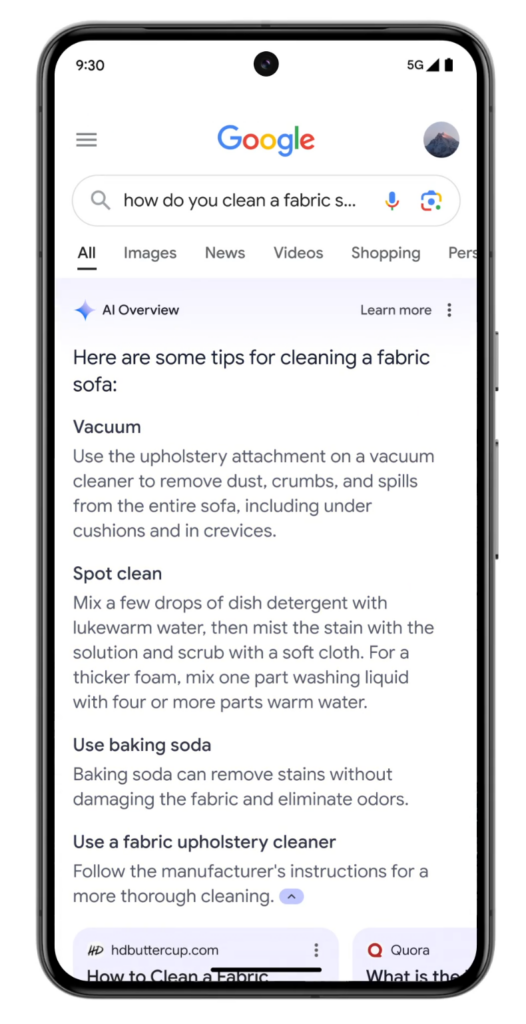
How often does Google crawl pages?
One of the questions that website owners and SEO specialists often ask is how often Google crawls pages that it has already crawled at least once.
Let’s start with the fact that Google’s bots must crawl the entire web to build their index. Web pages and documents are regularly updated, which means that Google has to crawl those URLs periodically.
John Mueller from Google shared that Google’s bots crawl at different frequencies. In some cases, they may do it several times a day, and in others, once every few months.
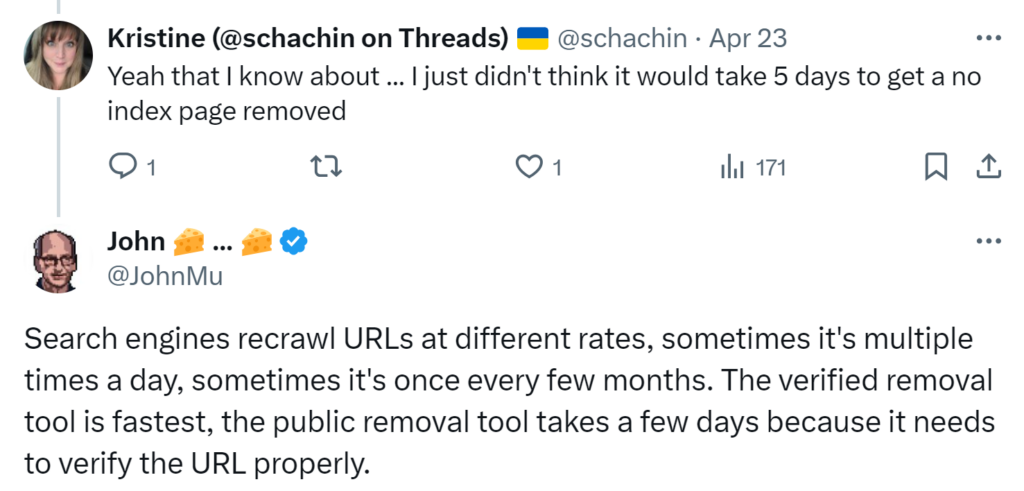
Will Google remove the Disavow Link Tool?
After Bing removed the Disavow Link Tool from Bing Webmaster Tools in September last year, questions have been raised about whether Google will do the same. An SEO specialist also expressed this concern.
In response, John said that we do not use this tool regularly. He added that he would not trust it if an SEO tool showed that toxic links must be removed fairly regularly.
Google now applies a Site Reputation Abuse Policy
In May, Danny Sullivan from Google announced on X that the company has officially started applying new policies related to site reputation abuse. These will target sites that do what is called Parasite SEO.
Soon after these new policies were introduced, questions arose among industry experts. Danny clarified that these policies are not related to which sites you link to or which sites link to yours. The policy focuses on content that aims to abuse a site’s reputation.
Does Google keep data on de-indexed pages?
An SEO specialist shared on LinkedIn that he noticed how Google removed canonical data, including user-selected and Google-selected data, that was initially indexed and then moved to the “crawled–currently not indexed” section. The question has come up here as to whether this is a mistake or if Google is removing this data.
In response, Gary Illyes said the company “keeps (almost) no data on un/de-indexed pages.“

Google confirmed a large number of removed URLs from the index
We briefly go back to April when Gary Illyes shared on stage at SERP Conf. that the Google team removed many URLs from the index in February. Gary said this was due to Google’s changed perception of these websites.
The reasons for pages being removed from the index can vary, and most often, they are related to technical issues, the quality they provide, and whether they are helpful to users.
When are websites affected by the Helpful Content Update expected to be recovered?
An SEO specialist asked John Mueller that question. He wanted to know how long a site is expected to recover after being affected by the Helpful Content Update and working on improving its quality.
In response, John said that more significant improvements should be seen after the release of future core updates.
Google adds new Googlebots
Google has released two new crawlers: GoogleOther-Image and GoogleOther-Video. These are GoogleOther versions optimized for fetching image and video bytes. In addition, the company has optimized the list of user agent strings to better reflect the most active user agent versions.
Google clarified that the release of the two new bots is meant to better support the crawling of binary data for research and development.
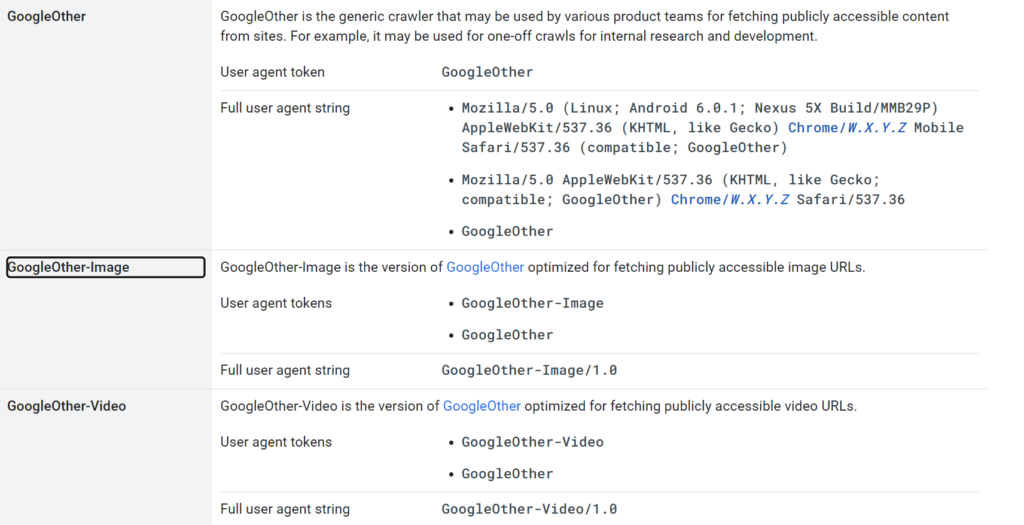
Google team is working on showing more quality content
We’re back on the topic of the Helpful Content update that the company released in September 2023. Many websites were affected after that update. What Danny Sullivan and John Mueller said is that the Google team is working on better visibility of sites that share quality content and has a lot of effort invested in it to provide more value.
Google recommends that you update your WordPress site to WordPress version 6.5
If you have a website and are using an older WordPress version, it’s time to change that. Gary Illyes wrote on his LinkedIn profile that upgrading to the latest 6.5 version of WordPress is highly recommended.
This is to improve the crawling of your site and, more specifically, the lastmod element in the sitemap. This signal aims to help the crawlers better understand your site and how often to crawl it.
However, before doing that, it’s important to ensure that switching to the latest version won’t conflict with the plugins you’re using.
Google updates its file types indexable documentation
In May, it was announced that the “File types indexable by Google” documentation had been updated. The new file type the search engine can index is .epub (Electronic Publication).
Google Search documentation leaked
One news that excited the SEO industry was the leak of Google Search documentation. Many experts commented on this and many different opinions came up.
Aleyda Solis shared on social media some main points from the leaked documentation based on an analysis by Mic King, CEO of iPullRank Agency.
Here is a part of them:
- There are over 14K ranking features;
- Google has a “siteAuthority” feature;
- Google stores which result has the longest click during a session;
- Google has a “hostAge” attribute that is used to remove “fresh spam” in serving time.
And here’s Aleyda Solis’ post on X:
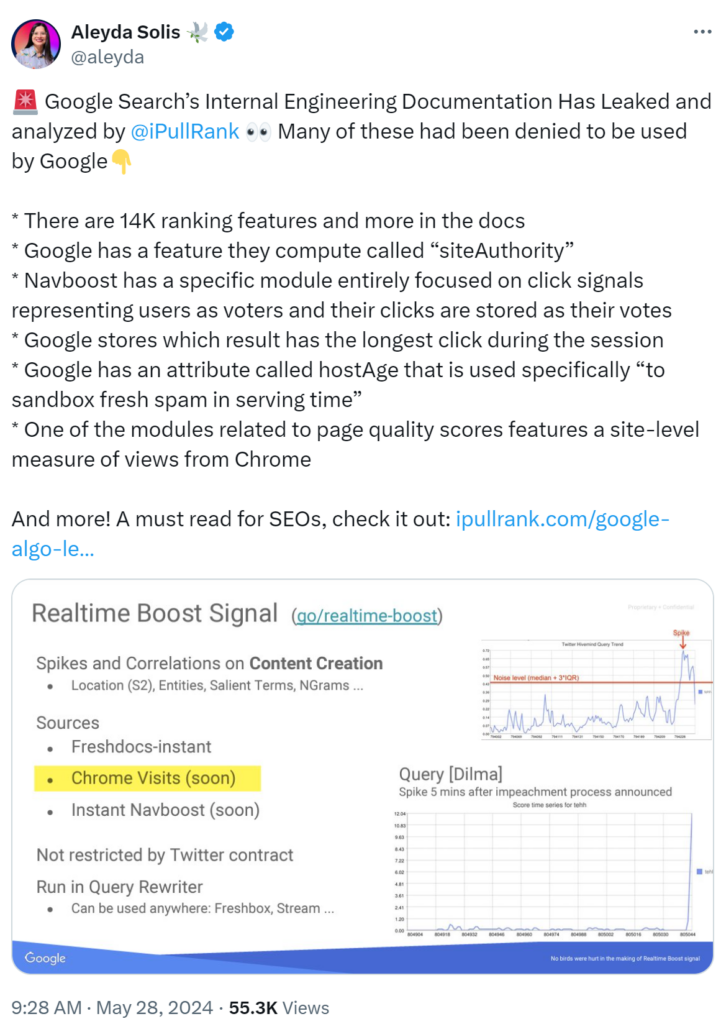
Google added new options to the Spam Reporting Tool
Since Google started implementing a Site Reputation Abuse Policy earlier this month, the company has added new options to the Spam Reporting Tool, including Site Reputation Abuse and Expired Domain Abuse.
